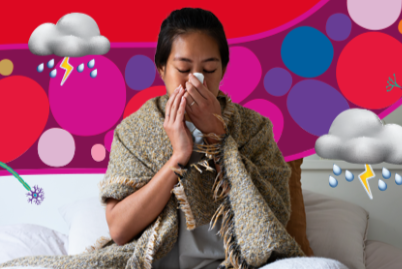Sniffle season is upon us, and there tends to be a spike in coughs, sore throats and runny noses, especially among children. Between childcare and school drop offs, and busy workplaces, it may feel impossible to keep your family cold-free this winter.
If you or a family member has a cold that you just can’t shake and you’re worried it may be something more serious, here’s what you need to know.
It's not uncommon for kids to get sick
There’s a reason it’s called the ‘common’ cold. Children may have 5–10 colds a year, while adults may have 2–4 colds each year. Children have a lower resistance to viruses than adults, and they're typically less diligent with washing their hands and covering their mouths. Their immunity will gradually build up as they get older though, resulting in fewer colds.
If your little one doesn’t show some signs of improvement from their cold over 2 days, or their symptoms get worse, it’s best to make an appointment to see your GP.

Get your 2025 flu vaccine voucher
Redeem a 0-point flu vaccination voucher via the Live Better rewards store in the MyMedibank app that can be used at your local Amcal Pharmacy, Discount Drug Stores or Myhealth Medical Centre if doing so is right for you.*
When to seek help for your little one
Sometimes it’s difficult to know if your child is experiencing a common cough or cold or if there is something more serious going on. If your little one has one or more of the following symptoms, you should see a doctor:
- Won’t drink fluids
- Vomits frequently
- Complains of an intense headache
- Is pale and sleepy
- Has difficulty breathing
- Has a high fever that doesn’t get better with paracetamol
- Has a cough that lasts more than two weeks
- Shows no sign of improvement after 48 hours
- Has any other signs that make you feel worried.
If your baby is under 3 months old and has a fever above 38°C, immediately take them to the nearest hospital emergency department. You should also seek immediate, emergency medical care if your child has a fever and a rash that does not turn white when pressed.
When to seek help for you or an older family member
If you or an older family member are experiencing one or more of the following symptoms, you should see a doctor:
- Won’t drink fluids
- Vomiting frequently
- Intense headache
- Is pale and sleepy
- Chest pain
- Difficulty breathing
- Rash with fever
- Symptoms have lasted longer than 10 days.
When it’s time to act
If you or a loved one is experiencing concerning symptoms such as trouble breathing, severe pain, chest pain, or loss of consciousness, you should immediately call triple (000) and ask for an ambulance.
However, unless otherwise advised by a doctor, home is the best place to be while your family recovers from mild symptoms of a cold. By staying home, you or your little one can have a proper rest and reduce the chance of spreading the virus to playmates, friends and family.







